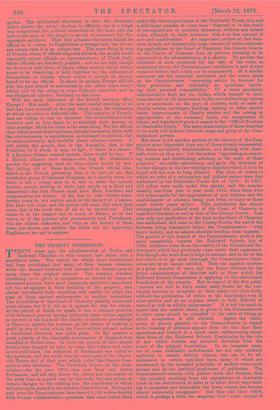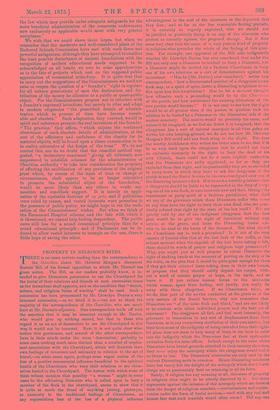THE CHARITY COMMISSION.
TWENTY years -ago, the administration of Public and Endowed Charities in this country had fallen into a scandalous state. The objects for which these foundations had been established had many of them become obsolete, while the income bestowed had increased in several cases to many times the original amount. The trustees, whether hereditary, or ex officio, or co-optative, or elected by classes of interested persons, were most commonly apathetic, sometimes not too scrupulous in their handling of the property, and almost universally both unwilling and unable to adapt the aims of these ancient endowments to modern necessities. The jurisdiction of the Court of Chancery possibly restrained some abuses, but if it did so, it opened the way for others. At the period of which we speak, it was a common practice with dishonest persons having indirectly some claims against or interest in the funds of the charity to institute proceedings in Chancery against the trustees, on the chance of making a profit by way of costs, which the Court seldom refused, unless a fraudulent intention was quite plain. In this manner a great quantity of the charitable endowments of England were muddled or filched away. In 1853 the growth of these abuses having been dragged to light by some able writers and some active politicians, the attention of Parliament was called to the question, and the result was the enactment of the Charit- able Trusts Act of that year, which called the Charity Com- mission into existence. The Twentieth Report of the Com- mission—for the year 1872—has just been laid before Parliament, and not only shows the extent and importance of the work done in a quiet way by this body, but also points to certain changes in the existing law, the expediency of which will scarcely be denied by the blindest Conservatives. During the past year the Commissioners have issued 1,705 orders dealing with various administrative questions that came before them under the various provisions of the Charitable Trusts Act, and a still larger number of cases were " disposed of in the result of correspondence or personal discussion, without any formal order, although in most instances with a no less amount of care and consideration." An important portion of this busi- ness, though not numerically large, consists of orders authoris- ing applications to the Court of Chancery, the County Courts, or the Courts of Common Law, by persons claiming to be interested in the administration of a charity. To prevent the initiation of suits promoted for the sake of the costs, as mentioned above, the Commissioners' certificate is now always required before such a suit can be commenced. Of a similar character are the inquiries instituted and the orders made by the Commissioners " conveying advice to trustees for their protection and indemnity on questions involv- ing their personal responsibility." Of a more peculiarly administrative kind are the Orders, which amount to more than one-half of all those issued in the year authorising various acts or assurances on the part of trustees, such as sales of charity estates, exchanges, building, mining, or other special leases, improvements of Charity estates, and the raising or appropriation of the necessary funds, the compromise of claims, and transfers of stock or money to the "Official Trustees of Charitable Funds." The mere enumeration of these branches of its work will indicate the wide range and grasp of the Com- missioners' powers.
But there is yet another portion of the labours of the Com- mission more important than any of those already enumerated. The latter are strictly administrative, and dealing with chari- table trusts as they are ; but the orders "appointing or remov- ing trustees and establishing schemes, or for some of those purposes," are really reformatory, and go in the direction of further changes in the law relating to charities which it is to be hoped will not now be long delayed. The class of orders to . which we refer of a reformatory and judicial nature were first authorised by the Charitable Trusts Act of 1860. In 1861, 207 orders were made under this statute, and the number steadily rose from year to year until 1872, when there were 414 orders made for the appointment of new trustees and the establishment of schemes, being just twice as many as those made twelve years earlier. This jurisdiction has almost extinguished the judicial work of the Court of Chancery in regard to Charities, as well as that of the County Courts. Last year only one application of the kind to the Court of Chancery was authorised, and none to the County Courts, the rest of the business being transacted before the Commissioners " with much facility, and an almost absolute freedom from expense." The growth of this branch of the Commissioners' work is the more remarkable because the Endowed Schools Act of 1869 withdrew from them the control of the Educational En- dowments which had previously come under their cognisance. But though the work done is large in amount, and as far as the law allows it to go most thorough, the Commissioners them- selves are by no means satisfied. They can appoint trustees in a great number of cases, and can frame schemes for the better administration of charities such as those which the Endowed Schools Commission is applying to the educational foundations of the country. But in respect of the first point, " powers are still in force under many trusts for the con- tinuing trustees to co-optate or elect others into their body, without the publication of notice or the knowledge even of other parties, and at an expense which is both difficult of control as well as wholly unnecessary." It is not too much to expect that the control which is given to the Commissioners in other cases should be extended to the state of things in which co-optation is still allowed. Again, the inade- quacy of powers granted to the Commissioners in regard to the framing of schemes appears from the fact that their operations are limited to a much more embarrassing extent than those of the Endowed Schools Commission by the rule of law which forbids any material deviation from the trusts of the original foundation. In an immense num- ber of cases charitable endowments are not only confined explicitly to certain definite objects, but are to be ad- ministered in certain specified ways, many of which are condemned by the accepted principles of modern economical science and by the practical good-sense of politicians. The Commissioners observe, with perfect truth and fairness, that "the mischief resulting from the expenditure of charitable funds in the distribution of doles or in other direct ways tend- ing to pauperise and demoralise the lower classes has become almost universally recognised ;" and they add their belief, which is perhaps a little too sanguine, that "some change of
the law which may provide under adequate safeguards for the more beneficial administration of the numerous endowments now exclusively so applicable would meet with very general acceptance.'
We wish that we could share these hopes, but when we remember that the moderate and well-considered plans of the Endowed Schools Commission have met with such fierce and powerful antagonism, although they have attempted to combine the least possible disturbance of ancient foundations with the recognition of modern educational needs supposed to be acknowledged on all hands, we own to some apprehensions as to the fate of projects which rest on the supposed public appreciation of economical orthodoxy. It is quite true that to carry out the suggestions of the Commissioners we need not raise or reopen the question of a " founder's " right to regulate for all unborn generations of men the destination and dis- tribution of the money he allocates to a public or quasi-public object. For the Commissioners propose not to interfere with a founder's expressed intentions, but merely to alter and adapt to modern exigencies " the prescribed details of adminis- tration which in process of time have become unsuit- able and obsolete." Such adaptation, they contend, would in spirit and substance promote the real intentions of the founder. " The practice," they affirm, " which enjoins the continued observance of such obsolete details of administration, at the cost of the efficiency and usefulness of the charity for its material objects, will be found upon a closer examination to be in reality subversive of the design of the trust." We do not contest this, nor do we doubt that the remedial method sug- gested, "a declaratory enactment" giving all tribunals, now empowered to establish schemes for the administration of Charities, authority " to take into consideration the propriety of effecting the modification of any provisions of the original .trust which, by reason of the lapse of time or change of circumstances, shall appear to be no longer calculated to promote the substantial object of the foundation," 'would be more likely than any others to evade ani- mosities and conciliate support. It is merely an appli- cation of the equitable doctrine of cy prjs, and if politicians were ruled by reason, and vested interests were powerless in the presence of public policy, we might hope to see the reali- sation of the Commissioners' wishes. But when we think of the Emmanuel Hospital scheme, and the fate with which it is threatened, we cannot help feeling despondent. The public cares still less for a sound economical principle than for a sound educational principle ; and if Parliament can be in- duced to allow vested interests to trample on the one, there is little hope of saving the other.



































 Previous page
Previous page